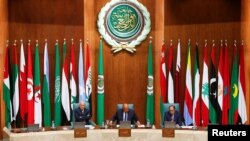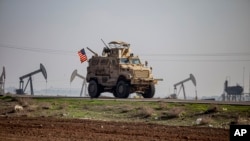With the Arab League agreeing to readmit Syria in the regional bloc, U.S.-backed Kurdish groups are expressing hope that this development will lead to a permanent resolution to the country’s 12-year conflict.
Arab League foreign ministers met Sunday in Cairo to vote on the reinstatement of Syria's membership after a suspension of nearly 12 years due to the government of President Bashar Assad’s brutal crackdown on anti-government protesters in 2011.
Syrian Kurdish groups welcomed the move, saying an active Arab involvement in Syria could activate a peace process in the war-torn country.
“We view this as a positive step, because it could lead toward a resolution,” said Dalya Henan, a leading member of the Syrian Democratic Council (SDC), the de facto political ruler in northeast Syria.
“But if we are looking for a real resolution to the Syrian conflict, all relevant sides must be involved,” she told VOA.
The SDC is the political wing of the Syrian Democratic Forces (SDF), a major U.S. partner in the fight against the Islamic State (IS) terror group. The two Kurdish-led groups are in control of nearly one third of Syria’s territory.
The Syrian government doesn’t recognize SDF’s de facto semi-autonomous region, and talks between the two sides in recent years have yielded no results, primarily due to Assad’s opposition to the Kurdish partnership with Washington.
Some 900 U.S. troops remain in Kurdish-controlled Syria as part of a global coalition against IS remnants. The Syrian government has been calling for their withdrawal.
But experts believe the U.S. is set on maintaining a low-cost, light-footprint presence in northeast Syria for the foreseeable future.
“The reality of an indefinite American context in Syria has settled into the strategy of regional actors, who now have a sense of the U.S.-imposed rules of the road to end the Syrian conflict,” said Nicholas Heras, a Syria expert at the Newlines Institute for Strategy and Policy in Washington.
“Fundamentally, the Biden team has an unspoken but active ‘don't look, don't touch’ approach to Syria policy that regional actors are coming to terms with: the U.S. won't look at regional, and European, rapprochement with the Assad government, but the regional actors won't touch the reality of American engagement with the Kurdish-led SDF zone in northeast Syria,” he told VOA.
But retired Colonel Myles B. Caggins III, a former spokesperson for the anti-IS coalition, believes Syria’s return to the Arab League could have implications for the U.S. military presence in the country.
“Assad’s restored regional legitimacy is another indicator that Washington will eventually pull troops out of northeastern Syria,” he told VOA.
A U.S. State Department spokesperson said Washington shared the goals of its Arab partners in Syria, including building security and stability, but remained “skeptical of Assad’s willingness to take the steps necessary to resolve Syria’s crisis,” according to Reuters.
“We do not believe Syria merits readmission into the Arab League at this time,” the spokesperson said Sunday, adding that U.S. sanctions on the Syrian government would remain in full effect.
Washington insists that the only viable solution to the Syrian conflict is the implementation of U.N. Security Council Resolution 2254, which was adopted in 2015.
Analyst Heras said the current U.S. political and military position in northeast Syria could help the Kurds in the future.
“This reality means that the Syrian Kurds have an opportunity to build an enduring, albeit necessarily multiethnic and inclusive reality in northeast Syria that can bargain better with Damascus,” he said.
Last week the Washington-based al-Monitor news site reported that Mazloum Abdi, the top commander of SDF, had traveled to the UAE seeking Abu Dhabi’s help in mediating a deal between the Kurds and Damascus.
Some information in this report came from Reuters. VOA’s Zana Omer contributed from Qamishli, Syria.
This story originated in VOA’s Kurdish Service.






